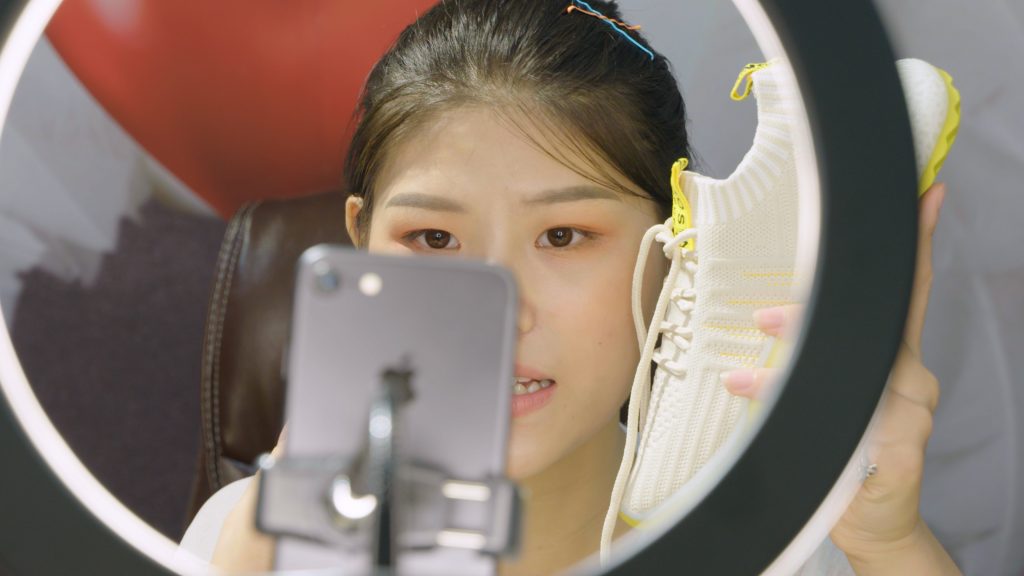June 24, 2021
by Carla Hay

Directed by Jessica Kingdon
Mandarin with subtitles
Culture Representation: Taking place in various parts of China, the cinéma vérité-styled documentary film “Ascension” features an all-Asian group of people at work and at leisure in this examination of how capitalistic consumerism works in Communist China.
Culture Clash: In a culture where the government enforces Communism/socialism and consumers embrace capitalism, the Chinese Dream is presented as an aspirational lifestyle of attaining wealth through hard work, but the dream remains out of reach for most people and is accessible to a small, elite percentage of the population.
Culture Audience: “Ascension” will appeal primarily to people who are interested in minimalist, “slice of life” documentaries about contemporary China, with no interviews, narration and analysis.

How does a system of capitalistic consumerism work in China, a country controlled by a Communist government? The cinéma vérité-styled “Ascension” shows different layers of this system and lets viewers make up their own minds about it. It’s a documentary that’s more than just a compilation of “slice of life” footage, because the movie is presented as a mosaic of a culture.
People in the movie are rarely identified by name and absolutely no one is interviewed for the film. Therefore, don’t expect any deep analysis or commentary about what’s in the movie. However, just like a mosaic, it’s up to viewers to look at all the different segments that are presented and see what the big picture is.
“Ascension” had its world premiere at the 2021 Tribeca Film Festival in New York City. It won the Tribeca Film Festival jury prizes for Best Documentary Feature, while “Ascension” director Jessica Kingdon received the festival’s 2021 Albert Maysles Award for Best New Documentary Director. It’s a documentary whose storytelling style is not going to be everyone’s liking, especially for people who prefer documentaries to tell as much as show. “Ascension” take a more subtle “show” approach and doesn’t try to make anyone a star of the movie with manipulative editing.
In order to fully appreciate “Ascension” (directed by Jessica Kingdon), it helps to have this synopsis from the movie’s production notes: “‘Ascension’ is an impressionistic portrait of China’s industrial supply chain that reveals the country’s growing class divide through staggering observations of labor, consumerism and wealth. The documentary portrays capitalism in China across the levels of its operation, from the crudest mine to the most rarefied forms of leisure.
“Accordingly, the film is structured in three parts, ascending through the levels of the capitalist structure: workers running factory production, the middle class training for and selling to aspirational consumers, and the elites reveling in a new level of hedonistic enjoyment. In traveling up the rungs of China’s social ladder, we see how each level supports and makes possible the next while recognizing the contemporary Chinese Dream remains an elusive fantasy for most.”
Once viewers know that “Ascension” has a specific structure, it gives a better context to watching the documentary. Otherwise, for people not really paying attention, the movie might just come across as a bunch of random footage of contemporary life in China. The movie filmed in 51 locations across China, according to the “Ascension” production notes.
Kingdon and Nathan Truesdell provided the movie’s often-stunning cinematography. (The visually majestic outdoor scenes are the documentary’s cinematography highlights.) And the music by Dan Deacon is very atmospheric—sometimes dreamlike, sometimes jarring, sometimes haunting.
“Ascension” begins with a prologue quote from a poem titled “Ascension,” written in 1912 by Kingdon’s great-grandfather Zheng Ze: “I ascend and look far into my heart, only to find everywhere already razed.” It’s perhaps the only clue in the movie about what Kingdon feels is being presented in this documentary’s view of contemporary China: The constant hope of the Chinese Dream (the aspiration to reach the heights of luxury through hard work) is often crushed under the weight of dead-end jobs.
The “factory worker” level of “Ascension” begins with a montage of company recruiters trying to entice people on commercial streets to work at low-paying factory jobs. They use microphones so that their voices can be heard above the noises of the crowds. The places looking for employees can be anything from well-known corporate companies to small businesses.
In this documentary, a phone manufacturing company and a pen factory were among those with recruiters on the streets. A big selling point used by many recruiters is telling potential employees that people can sit while doing the job, since many other blue-collar jobs involve standing for long hours. The salaries mentioned are, on average, 16 yuan (or about $2) per hour.
Also on these streets are large electronic signs with a variety of slogans that read, “Sense of Worth,” “Chinese Dream” and Work Hard. And All Wishes Come True.” But do these wishes really come true? It depends on what those wishes are and who has those wishes.
“Ascension” then gives viewers glimpse in to the types of factory jobs that are the backbone of China’s economy. It’s why so many people around the world have at least one item with the label “Made in China.” The factory locations filmed in this segment of the documentary include a garment factory in Shenzhen; WM Doll (a sex doll company) in Zhongshan; a factory that processes cooked chicken; and a factory that makes pill bottles.
At the WM Doll factory, two female workers focus on how to repair the shoulder of a mannequin. At the garment factory, workers make pants and go through a quality assessment process. Workers at another factory are seen having a cafeteria-styled lunch.
The “middle-class” level of the documentary is the one where people have the liveliest personalities. Rather than having jobs where they’re expected to be “worker bees” and “drones,” there’s a lot more emphasis on being successful entrepreneurs. It’s at this level that the Chinese Dream seems more attainable, and that optimistic hope is more evident in the workforce.
One of the more memorable highlights of this middle-class segment is footage from Star Boss Entrepreneurial Camp, a two-day workshop where the motto is “Monetize Your Personal Brand.” The female leader of the workshop is energetic and enthusiastic in her pep talks and advice on personal sales: “Buying is a choice, one we don’t have to make,” she says. “Why should people buy from you? Because you’re a brand.”
She further notes that people will buy from those whom they like and trust. “We’re in a fan economy era. If you have a large fan base, you have everything.” At the conclusion of Star Boss Entrepreneurial Camp, participants have a “graduation” ceremony, where they get framed completion certificates, go in front of the room, and say their company name and profit goals. The goals are predictably high, with people saying that they want to make millions within the next five years.
“Ascension” also shows how China is part of the boom of entrepreneurs who want to get rich through social media. Just as it is in Western countries, “influencer culture” is huge in China. A woman is shown livestreaming a product demonstration for Yiwu Siwen Shoe Company, so that she can sell athletic shoes. Another woman, who’s a beauty influencer, takes selfies and does a makeup tutorial.
At a flight attendant training program (where all of the participants are women, except for one man), the emphasis is on etiquette and physical attractiveness. Someone who’s not shown on camera says in a micophone to the class: “There’s a saying that every Chinese woman is a pretty Chinese business card. So every Chinese woman, let’s present the prettiest image of China!” When the class completes the training, the graduates pose for a group photo.
The documentary also shows training sessions for jobs that usually attract men. There’s footage of International Butler Academy in Chengdu, where potential butlers are shown how to do proper housekeeping duties, such as bedsheet preparation. Waiters are also shown training at Windows of the World, an upscale restaruant in Shenzhen.
At Genghis Security Academy in Bejing, training looks very similar to a police academy, since the trainees are armed with guns. In a military-styled line of standing trainees, one man makes a mistake, and the instructor shouts at him and kicks him. As further punishment, this trainee is ordered to do push-ups in front of the other trainees.
A documentary about consumerism wouldn’t be complete without footage of people spending money. “Ascension” includes scenes from New South China Mall in Dongguan and New Century Global Center in Chengdu. People are shown gathered at a water park in New Century Global Center. There’s also footage of a computer video game arcade, populated almost entirely by males in their teens and 20s.
The “elite” segment toward the end of the documentary is also the shortest segment. There’s footage of a dinner at Windows of the World, with three men and two women, who are in the late 20s or early 30s. They are all presumably wealthy. One of the women says, “I like the U.S. … because of the freedom.” One of the men says in response, “Personally speaking, I’m a patriot [of China] … China is a global player now.”
This confidence in China’s economy is also expressed at JALA’s annual conference in 2020. (JALA Group is a leading cosmetics enterprise in China.) “Ascension’s” footage of this conference includes a speaker who tells the large audience of hundreds who are gathered for the speech: “Chinese brands must win!”
As much as “Ascension” shows about the Chinese economy and workforce, the documentary can get viewers to think about what’s missing from the movie that would be in a documentary about the American economy and work force. An American documentary would have complaints of employee burnout or exploitation; the minimum wage as it relates to being a “living wage”; employee contracts; taxes and tarriffs; labor laws, etc. The point is that the American Dream and the Chinese Dream might have many things in common, but the freedom to speak out against flaws in the system is another story.
UPDATE: MTV Documentary Films will release “Ascension” in select U.S. cinemas on October 8, 2021. Paramount+ begins streaming the movie on November 15, 2021.
